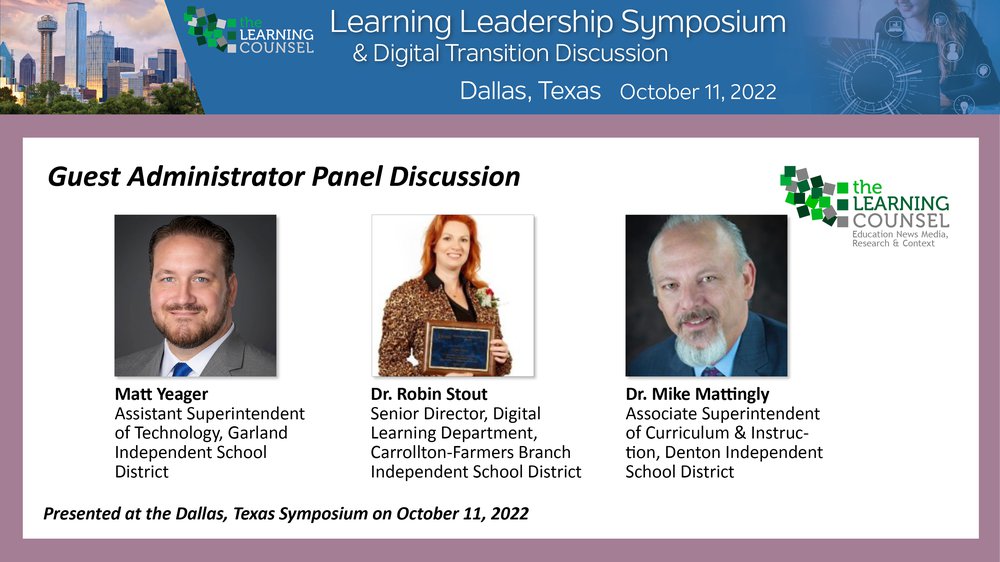If you follow the Learning Counsel’s Learning Leadership Symposia, you are aware that the Administrator Panel Discussions are generally the perfect end to a perfect day. They feature the area’s top education minds, tackling their most perplexing challenges. And true to form, they don’t worry about stepping on toes, as long as the solutions present themselves.
In this year’s Dallas area Symposium, panelists included Matt Yeager, Assistant Superintendent of Technology for Garland Independent School District, Dr. Robin Stout, Senior Director of the Digital Learning Department at Carrollton-Farmers Branch Independent School District, and Dr. Mike Mattingly, Associate Superintendent of Curriculum and Instruction at Denton Independent School District.
According to Panel Host LeiLani Cauthen, Learning Counsel News Media and Research CEO, “We framed, the biggest challenge right now as a structural one, because we think at Learning Counsel Research, it looks like there's a lot of problems, we’re losing the kids, we can't get the teachers, achievement loss during the pandemic, and blah, blah, blah. Okay. But we've identified the real problem, it is the structure itself, because the real outside pressure is consumer learning. It's the chaos of the open market.”
Dr. Mike Mattingly, Associate Superintendent of Curriculum and Instruction at Denton Independent School District said, “We have two big challenges in the state of Texas. Most everyone has experienced a huge learning loss. Our larger challenge, at least in our district, is finding quality teachers and paraprofessionals, secretaries bus drivers, you name it. All staff members are shorthanded right now. And when you do that, it's hard to be safe and secure. It's hard to provide high quality instruction on a minute-by-minute basis. You're relying on your systems that are in place to help you with that. I think this caught us off guard. We did not prepare for the shortage of personnel that would be available to us. Being in a university district, we usually have first choice at some of the brand-new graduates that come out, because we have relationships with universities and with those student teachers. But that's not the case anymore. We had a lot of people walk away.
“In the past, mathematics, science, special ed, world languages have had their fair share of shortages. But English, language arts, mathematics, I mean, just your typical core teachers do not exist. And I don't think that there's a tracher shortage. There's a teacher exit; they have made decisions to walk away over one year. Otherwise, we could not have had this great of a shortage. So, they're making decisions not to return to the classroom and they're leaving the classroom, or at least in our district on a weekly basis.”
Dr. Robin Stout, Senior Director of the Digital Learning Department at Carrollton-Farmers Branch Independent School District, concurs. “We are having that as one of our challenges. Luckily our staffing numbers are better than what we've heard from some of the surrounding districts. One of our challenges though is we've had to get creative with getting people in. And so, the criteria may be slightly different than it had been in the past. They opened that up to retired personnel and we're also bringing in people that are on the cusp of certification, but haven't quite gotten it yet.”
Matt Yeager, Assistant Superintendent of Technology for Garland Independent School District sees challenges through a technology lens. “The biggest thing is that a lot of the teachers are not teaching anymore because of change stress. It's not about the stress of the pandemic. Everyone's in the same boat. We all went through it. I think we all support each other that way. But it's that management of change. We all threw a lot of stuff at them within a week. you know, March hit and we just threw stuff at them and said, you gotta do this. And no one prepared them for it.
And they did it well. But the thing is, we haven't come back around and supported that and taken away stuff we kept moving forward. With any bad situation's, always good outcomes, in a sense. The pandemic helped us achieve things better and faster We loaded it up and we haven't taken away. And so those are some big challenges right now we're trying to figure out is what resources can we start removing as we start focusing it? And so, we're trying to minimize our systems and not have a hundred systems out there.”
After the panel laid out the major challenges of the day, they talked about the solutions that were needed, and the good ideas were flowing fast – good, useful information and no holds barred. These are real, common-sense solutions, and the panel laid them out there for the taking. This is one video you won’t want to miss. Their challenges are your challenges, and you’ll find their solutions may work wonders in your own school or district.











